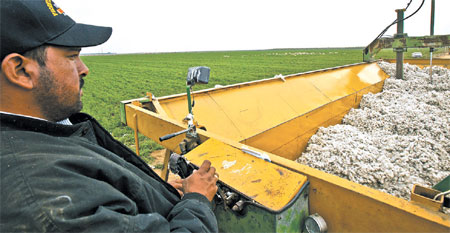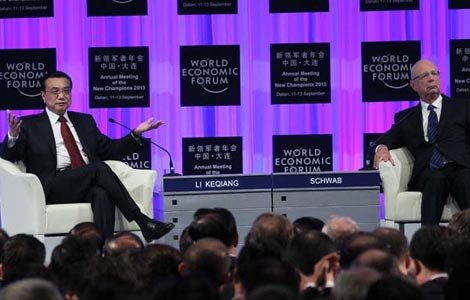Commodity markets hold breath over Chinese cotton policy
Updated: 2013-09-13 11:44
By Caroline Berg in New York (China Daily)
|
||||||||
|
Pima cotton is compacted after being harvested on a farm in Wasco, California in this file photo. China's demand for cotton has become a big factor in US exports now. Chip Chipman / Bloomberg |
As the US Department of Agriculture (USDA) sees it, the greatest uncertainty for US commodities trade with China lies in the cotton fields.
"Right now, China holds a very large proportion of cotton stocks," chairperson of commodity forecasts for the USDA's World Agricultural Outlook Board Gerald Bange told China Daily. "One thing we're looking at is what China is doing with regard to cotton in terms of their cotton imports and cotton stocks relative to the world."
The latest USDA World Agricultural Supply and Demand Estimates (WASDE) report published yesterday shows China is forecast to hold about 58.3 million of the world's 94.7 million bales of cotton stocks.
"You have more than half of the world's cotton stocks being held by China, which is substantially more than the cotton they produce in any one year," Bange said. "They have almost two years of stocks on hand, so they've got quite a bit."
The question is, Bange said: "Will China continue the same [cotton] policies that it has had for several years now, or will it change those policies? Obviously, that's up to China. We just have to wait and see what China does."
According to a Reuters report published last month, China is preparing to end a controversial system of stockpiling in which the government buys up most of the domestic crop at above-market prices, in favor of subsidizing cotton farmers. This change could slash imports by the world's top cotton buyer and signal a widespread shakeup of Beijing's overall farm policies, the report said.
Since it is so hard for them to find high-grade fiber locally, Chinese textile mills have been lobbying for permission to import more cotton, which would help boost prices from key cotton exporters, such as the US and Australia, according to a July report by the Pakistani Daily Times.
Meanwhile, China keeps strict controls over cotton imports in favor of supporting local growers under its aggressive stockpiling program, the report said.
China depends on about 425 million farmers in general, according to Factsanddetails.com. Pressure has been building from all sides for China to end its stockpiling practices, the Reuters report said. Abandoning the stockpile policy would mark the end of a system that has distorted the market to the point that it has been cheaper for Chinese mills to import cotton grown abroad than to buy domestic produce, according to the report.
Changes in China's cotton policy could occur within months, which could also stimulate a shift to subsidies for growers of other commodities including sugar and oilseeds, such as soybean, the report said.
In the WASDE report, China's soybean production estimates were down 0.3 million tons to 12.2 million as a result of excess rainfall and flooding in the northeast. If these predictions come to bear, this will be China's smallest soybean harvest since the 1992-93 season.
The report's estimates for China's 2013-14 rice crop were lowered 1 million tons to 142 million tons, down 1 percent from last season. Hot, dry weather in the lower Yangtze River Valley and the southwest stressed mostly the single rice crop. The report said rice production is likely to be negatively affected in Hunan, Jiangxi and Anhui provinces.
Despite these declines, Bange said he was not concerned and that both soybean and rice production were still relatively in tune with historical records.
"I don't see anything with regard to China as surprising to us," Bange said in general about the commodities results in the WASDE report. "The biggest uncertainty we have at the moment is with regard to what China's cotton policy may or may not be in the future, and we just don't know that right now."
carolineberg@chinadailyusa.com
(China Daily USA 09/13/2013 page10)
Most Viewed
Editor's Picks

|

|

|

|

|

|
Today's Top News
Economist calls for global Marshall Plan and currency
China's new 'Green Fence' puts pressure on US recyclables
Commodity markets hold breath over Chinese cotton policy
One in four men in Asia-Pacific admit to rape
China supports trade ties: Michigan governor
WB head to discuss climate in China visit
US moves against China firms criticized
Navy chief cruises into DC
US Weekly

|

|














